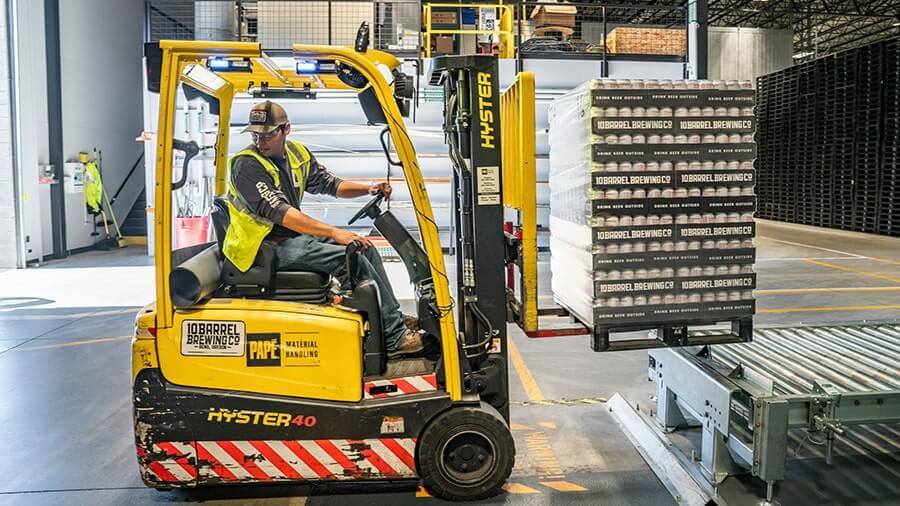Breaking into the Warehouse World

The world of warehousing is diverse and exciting; it's where the magic of commerce truly comes to life. Warehouses are essential in ensuring that products are efficiently stored, managed, and distributed to their intended destinations. Have you ever wondered about the bustling world of warehouse roles? Whether you're a seasoned pro or just starting, the warehouse sector offers a diverse range of opportunities that keep the wheels of commerce spinning. Let's dive into the types of jobs within the warehousing industry!
Shipping and Receiving Clerks: The Forefront of the Warehouse
Shipping and receiving clerks are the frontline communicators of the warehouse, managing the flow of goods both into and out of the facility. Their primary responsibility revolves around handling incoming and outgoing shipments, ensuring accuracy, timeliness, and efficiency throughout the process. They also handle any issues or concerns related to shipping and receiving. A shipping and receiving clerk should have excellent organizational and communication skills, as well as the ability to work well under pressure.
Warehouse Associates: Jacks-of-All-Trades
Warehouse associate is an umbrella term for versatile team members who perform various tasks to support the daily operations of the warehouse. From unloading shipments and restocking shelves to assisting with inventory counts and fulfilling orders, their adaptability keeps the warehouse running smoothly. This is typically an entry-level position that serves as a stepping stone for individuals looking to gain experience and advance in warehousing.
Material Handlers: Masters of Movement
Material handlers are responsible for the physical movement of goods within the warehouse. Using hand trucks, pallet jacks, and other equipment, they transport materials to designated storage areas or loading docks, maintaining a steady flow of goods throughout the facility.
Returns Processing Specialists: Gurus of Reverse Logistics
Returns processing specialists handle the flow of returned goods in a warehouse. This involves inspecting returned items to determine their condition and deciding whether they can be resold or need to be disposed of. Their attention to detail and communication skills help maintain customer satisfaction during the returns and refund process. Returns processing specialists are also responsible for maintaining accurate records of returned items. This includes updating the inventory system to reflect returned items, tracking the reason for the return, and identifying any trends or patterns in returns.
Forklift Operators: The Movers and Shakers
Forklift operators are the power players, moving goods efficiently across the warehouse floor. With safety as their mantra, these skilled operators navigate tight spaces and lift loads to keep inventory properly stocked. They load and unload products from trucks and shelves, ensuring that products are safely and efficiently transported. A forklift operator should have a forklift certification and experience operating a forklift in a warehouse setting.
Picking and Packing: The Heartbeat of Fulfillment
At the core of any warehouse operation are the pickers and packers. They're the ones who ensure that your order is accurately selected and securely packaged. Order Pickers locate items within the warehouse based on picking lists or digital orders, while Packers carefully package items for shipment, ensuring they are protected from damage during transit. It's a role that demands attention to detail and a knack for organization.
Inventory Specialists and Clerks: The Number Crunchers
Maintaining accurate inventory records is vital for efficient warehouse operations, and that's where inventory specialists and clerks come in. These professionals are responsible for counting, recording, and tracking inventory levels using specialized software or manual methods. They conduct regular audits to identify discrepancies, assist in replenishing stock, and collaborate with other departments to forecast demand and prevent stockouts or overstock situations. Precision and analytical skills are their superpowers.
Quality Control Inspectors: The Gatekeepers
Quality control inspectors are the final checkpoint before products head out the door. They ensure that every item meets the standards set by the warehouse by inspecting products for damage, defects, and accuracy. They also ensure that products are properly labeled and packaged for transit and customer satisfaction. A quality control inspector should have excellent attention to detail and strong communication skills.
Supervisors and Managers: The Strategists
Supervisors and managers oversee operations, lead teams, and strategize for efficiency. They're the decision-makers who drive performance and nurture talent within the warehouse. For example, one leader at the helm of every successful warehouse operation is a skilled and experienced warehouse manager. This role involves overseeing warehouse operations, from receiving and storing goods to ensuring efficient order fulfillment. Warehouse managers are responsible for optimizing workflows, managing inventory levels, coordinating shipments, and supervising warehouse staff to ensure productivity and safety standards are met.
The world of warehouse roles is a vibrant and essential component of the global supply chain, offering a wide range of opportunities for individuals at various stages of their careers. Whether you're interested in management, operations, or logistics, there's a role suited to you. Ready to explore these opportunities? Your next career move could be at a warehouse near you!
